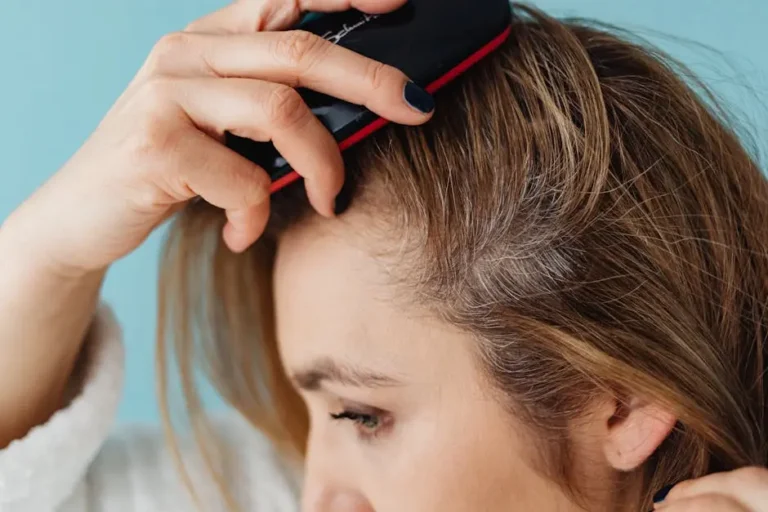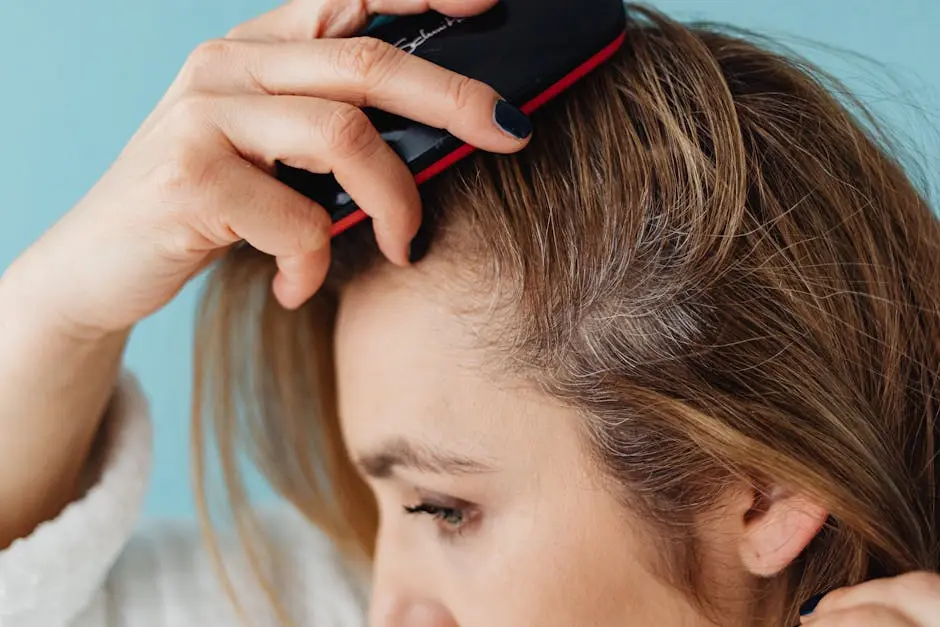Hair loss can be a distressing experience, and it often takes many by surprise. While it’s commonly associated with genetics, there are various other factors at play that might contribute to this issue. In this blog, we delve into some unexpected causes of hair loss and provide effective ways to tackle them. So, whether you’re just starting to notice thinning locks or you’re well into your hair loss journey, there’s something here for you.
1. Hormonal Imbalances and Their Impact
Hormonal imbalances are often overlooked as a cause of hair loss, yet they can play a significant role in the health of your hair. Conditions such as thyroid disorders or polycystic ovary syndrome (PCOS) can result in fluctuating hormone levels, which in turn may trigger hair thinning. Hormones like estrogen and testosterone influence hair growth cycles, and any disruption can lead to shedding more than normal.
To address this issue, it’s crucial to consult with a healthcare professional who can provide a thorough evaluation of your hormonal health. Blood tests can help determine any underlying hormonal issues. If a hormonal imbalance is identified, treatments may include medications or lifestyle changes aimed at restoring balance.
2. Stress and Its Hidden Effects on Hair
Stress is one of the biggest culprits behind hair loss, yet it can often go unnoticed as a significant factor. When you experience stress, your body goes into a fight-or-flight mode, which can disrupt your hair’s natural growth cycle. This disruption can lead to a specific type of hair loss called telogen effluvium, where hair follicles enter the resting phase more rapidly than usual.
Learning stress management techniques is essential. Consider incorporating practices such as mindfulness, yoga, or regular exercise into your routine. These methods can not only help reduce stress levels but may also promote healthier hair growth. Additionally, speaking with a mental health professional can provide further support during challenging times.
3. Nutritional Deficiencies You Might Not Suspect
Another surprising cause of hair loss is nutritional deficiencies, which can go unnoticed until they manifest as thinning hair. Critical vitamins and minerals such as iron, zinc, and biotin play essential roles in maintaining healthy hair follicles. A lack of these nutrients can lead to weak strands and increased shedding over time.
To counteract this, it’s a good idea to evaluate your diet. Incorporate nutrient-rich foods such as leafy greens, nuts, fish, and eggs. For some, a supplement may also be beneficial, but it’s essential to consult with a healthcare provider before starting any new regimen. A well-balanced diet not only supports overall health but also strengthens your hair from within.
4. The Role of Medications in Hair Loss
Certain medications can lead to hair loss, often as a side effect that can be easily overlooked. Common drugs, such as those used for high blood pressure, depression, or certain cancer treatments, can interfere with hair growth cycles. If you’ve started a new medication and noticed increased shedding, it’s worth discussing this concern with your healthcare provider.
If it’s determined that your medication is contributing to hair loss, your doctor may suggest alternative treatments or ways to mitigate the effects. Don’t hesitate to be open about your experiences with medications, as finding the right balance is key to maintaining both your health and your hair.
5. Scalp Conditions that Cause Thinning
Often, people do not realize that scalp conditions like dandruff, psoriasis, or dermatitis can directly contribute to hair loss. These conditions can cause inflammation and irritation of the hair follicles, hindering growth and leading to thinning hair. Recognizing and treating these scalp issues is essential for promoting healthy hair.
Over-the-counter shampoos and treatments designed to soothe and clear up scalp conditions can be effective. For persistent issues, it’s wise to consult a dermatologist who can recommend targeted treatments. Keeping your scalp healthy creates the ideal environment for hair growth and minimizes the likelihood of shedding.
6. Aging Process and Its Effects on Hair
As we age, it’s natural to observe changes in our hair, including a decrease in thickness and overall density. This change is largely attributed to the slowing of hair growth cycles and a reduction in the number of active hair follicles. While aging is inevitable, being proactive can help you manage its effects on your hair.
To maintain hair health as you age, consider using products formulated specifically for mature hair. These can help nourish the scalp and replenish moisture, addressing issues such as dryness and brittleness. Additionally, regular trims can prevent split ends, maintaining a healthier appearance overall.
7. The Impact of Hair Styling and Treatments
Many individuals may not be aware that styling practices and chemical treatments can bring about hair loss as well. Frequent use of heated tools, dyes, and harsh chemicals can weaken hair strands over time, leading to breakage and thinning. It’s essential to strike a balance between maintaining your desired look and protecting your hair’s integrity.
To promote healthier styling practices, consider limiting heat exposure and opting for heat-protectant products. Additionally, giving your hair breaks from dyes and tight hairstyles allows for recovery. Incorporate deep conditioning treatments into your routine to restore moisture and strengthen your strands, making them more resilient against everyday styling challenges.
8. Genetics: More Than Just a Family Trait
While genetics is often seen as a primary factor in hair loss, it can have more nuances than many realize. The concept of hereditary hair loss varies; the genes you inherit can influence how and when you experience thinning. It’s essential to understand that while you may have a genetic predisposition, it’s not a definitive fate.
There are various treatments available that can help mitigate the effects of genetic hair loss. Options such as minoxidil and finasteride have shown promising results in many cases. Additionally, hair transplant surgery may be suitable for some individuals who wish to achieve fuller hair. Regardless of genetic influences, taking proactive steps can empower you in your hair loss journey.
9. Autoimmune Disorders and Hair Loss
Autoimmune disorders can also be an unexpected cause of hair loss. Conditions like alopecia areata occur when the immune system mistakenly attacks hair follicles, leading to patchy hair loss. It’s important to recognize that this form of hair loss can have emotional as well as physical effects.
If you suspect an autoimmune disorder is affecting your hair, consulting a healthcare professional is crucial. Treatments may include corticosteroids to reduce inflammation or new therapies that stimulate hair growth. Being diagnosed can provide avenues for support and management to help you navigate hair loss.
10. Environmental Factors You May Overlook
When considering the causes of hair loss, environmental factors often get overlooked. Exposure to pollutants, harsh weather conditions, and even chlorine from pools can all adversely affect hair health. These elements can strip away natural oils, leaving hair weakened and more prone to breakage.
To protect your hair from environmental damage, try to limit exposure to harsh chemicals and cover your hair when out in extreme weather. Implementing a regular hair care routine featuring protective products can create a barrier against pollutants. Staying hydrated and maintaining good nutrition also plays a pivotal role in enhancing hair resilience.
11. The Connection Between Hair Loss and Mental Health
Mental health plays a role in the experience of hair loss that many may not initially consider. Conditions such as anxiety and depression can lead to hair loss through stress, as previously mentioned, but they can also affect the way we care for ourselves, potentially resulting in neglected hair health.
Maintaining mental well-being is just as crucial as caring for your hair. Seeking support through therapy or joining support groups can offer assistance to those struggling with their mental health. Additionally, engaging in self-care activities can enhance both your emotional health and, in turn, may improve your hair’s condition.
12. Sleep Deprivation: A Hidden Cause
Sleep deprivation is a hidden yet powerful factor in hair loss. Lack of adequate sleep not only affects overall health but also disrupts the body’s repair processes, which includes hair growth. Chronic sleep issues can lead to increased levels of stress hormones that might negatively impact hair follicles.
Prioritizing quality sleep is essential. Aim for a consistent sleep schedule, and create an environment conducive to rest—dim lighting, comfortable bedding, and relaxation techniques before bed can help. Incorporating these practices into your routine can foster better sleep, which in turn supports healthier hair.
13. Tight Hairstyles and Their Long-Term Effects
Tight hairstyles are a common and often convenient choice, yet they carry the risk of long-term damage to your hair. Styles that pull on the hairline can cause traction alopecia, a form of hair loss resulting from constant tension. Many individuals may not recognize the implications tight styles have on their hair until it’s too late.
To avoid this, consider opting for looser hairstyles whenever possible and incorporating variations into your styling routine. Allowing your hair to rest can help prevent traction and promote healthier growth. On days when you do pull your hair back, try using soft hair ties that are gentle on your strands.
14. The Effects of Smoking on Your Hair
The impact of smoking on various aspects of health is well-documented, but its effects on hair often go unnoticed. Smoking can reduce blood flow to the scalp, which deprives hair follicles of essential nutrients and oxygen needed for growth. Consequently, this can lead to hair loss and premature graying.
Quitting smoking can significantly enhance overall health and prevent further damage to your hair. Engaging in a health-conscious lifestyle, filled with nutritious foods and regular exercise, can aid in recovery. Over time, you might find that your hair begins to regain strength and vitality, alongside noticeable improvements in other aspects of your well-being.
15. Strategies for Reversing Hair Loss
Finally, it’s crucial to acknowledge that while hair loss can feel overwhelming, there are strategies available to help reverse or manage its effects. Understanding the cause of your hair shedding is the first step in implementing an effective action plan. Products containing minoxidil can stimulate hair growth, while treatments such as platelet-rich plasma therapy are gaining popularity for their effective results.
In addition to medical treatments, adopting a healthy lifestyle can produce significant benefits. Regular exercise, maintaining a balanced diet, and managing stress can create a holistic approach to hair health. Consulting with a dermatologist or hair loss specialist can help tailor strategies best suited for your specific needs and pave the way for recovering your confidence and cherished locks.


